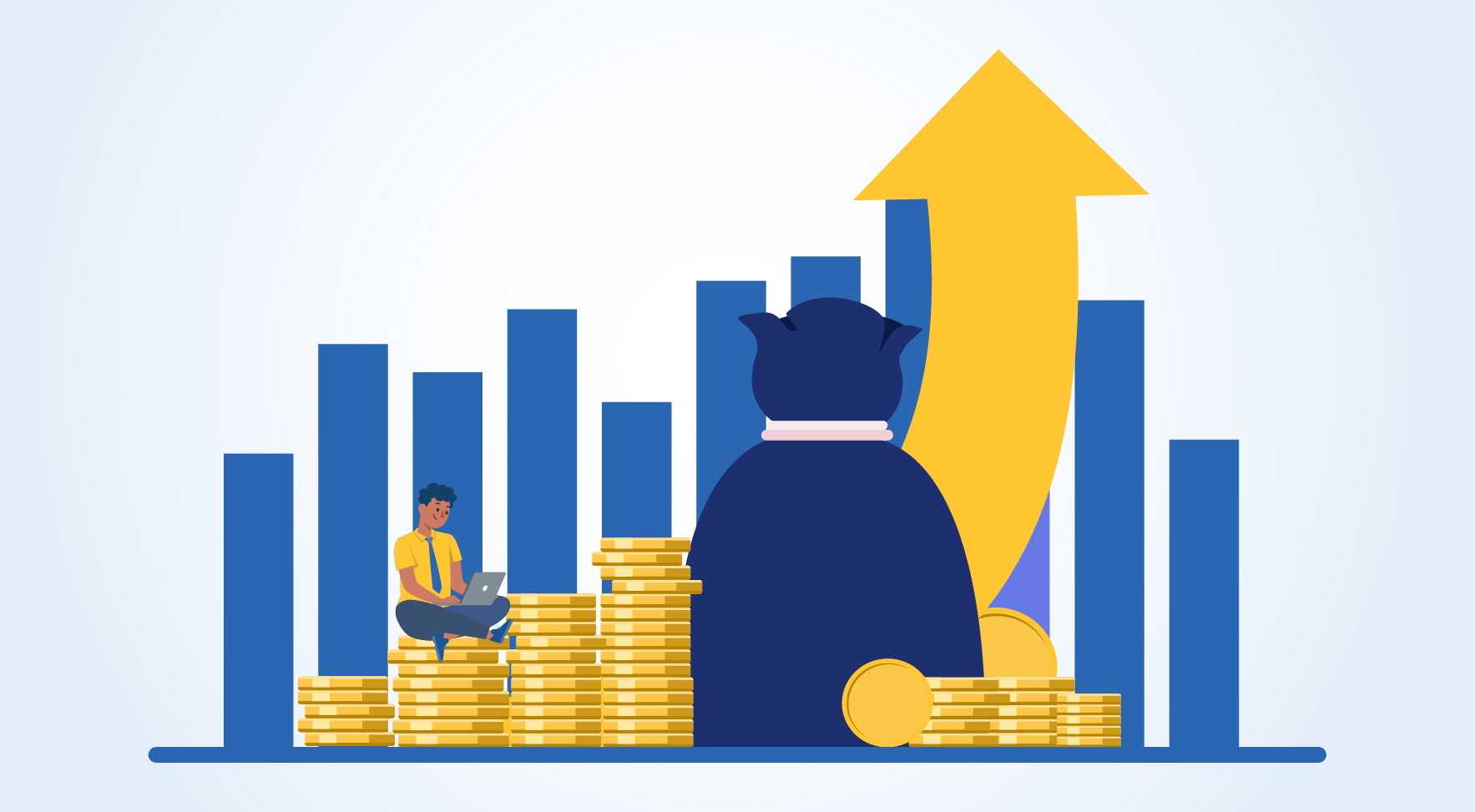Pramit Pratim Ghosh |Updated on: July 4, 2023
- Introduction
- GST Exemption List - Goods & Services
- Essential Goods & Services at 5% GST slab
- Standard Goods & Services at 12% GST slab
- Standard Goods & Services at 18% GST slab
- Special / Luxury Goods & Services at 28% GST slab
- Articles outside the GST Tax Rate Slabs
- Treatment of Luxury / Demerit Goods
- GST Rates on Loans and Advances
- GST on car loan
- GST on real estate
- How-GST-impacts-our-economy?
- FAQs
Introduction
Ever since GST or Goods and Services Tax regime was announced, there has been a wide speculation about the GST rates bracket. The GST Council is the body that decides the rate slabs and the GST Council has been periodically revising the list of goods and services for each rate slab.
It’s clear that the Government’s intentions are to have lower tax rate for goods and services which are essential needs and higher tax rates for goods and services that are considered as luxury supplies.
Here’s a curated a list of GST rates structure for various goods and services, classified across the different GST tax slabs –
GST Exemption List - Goods & Services
|
Goods |
Services |
|
Poultry Products – Fresh Meat, Fish, Chicken, Eggs |
Hotel Services priced at less than INR 1000 |
|
Dairy Products – Milk, Curd, Butter Milk, Jaggery (Gur), Lassi, unpacked Paneer |
Education (exemption continued from before) |
|
Fresh Fruits & Vegetables |
Healthcare (exemption continued from before) |
|
Food Items – Natural Honey, Flour (Atta & Maida), Pulses, Basmati Rice, Gram Flour (Besan), Bread, Vegetable Oil, Religious Sweets (Prasad), Common Salt |
|
|
Cosmetics & Accessories – Bindi, Vermillion (Sindoor), Bangles |
|
|
Stationery – Stamps, Judicial Papers, Printed Books, Newspapers |
|
|
Handloom Products |
|
|
Textile – Jute, Silk |
|
|
Contraceptives |
Essential Goods & Services at 5% GST slab
|
Goods |
Services |
|
Dairy Products – Skimmed Milk Powder, Milk food for babies, Condensed milk, Packaged Paneer, Cream |
Railway Travel |
|
Frozen Vegetables |
Economy Class Air Travel |
|
Food Items – Sugar, Spices, Edible Oil, Pizza Bread, Rusk, Sweets, Fish Fillets, Tapioca (sabu daana) |
Cab Aggregators (e.g. Uber & Ola) |
|
Beverages – Coffee, Tea, Juices |
|
|
Apparel – below 1000 INR |
|
|
Footwear – below 500 INR |
|
|
Fuel – Kerosene, LPG, Coal |
|
|
Solar Panels |
|
|
Common Utilities - Broom |
|
|
Medical Goods - Medicines, Stents |
|
|
Newsprint |
|
|
Lifeboats |
|
|
Textile – Cotton, Natural Fibre and yarns |
|
|
Incense Sticks (Agarbatti) |
Standard Goods & Services at 12% GST slab
|
Goods |
Services |
|
Dairy Products – Butter, Cheese, Ghee |
Non-AC Hotels & Restaurants |
|
Packaged Dry Fruits |
Business Class Air Travel |
|
Food Items – Snacks (Namkeen & Bhujia), Packaged Chicken, Sausages, Jams, Sauces |
|
|
Beverages – Fruit Juices, Packed Coconut Water |
|
|
Apparel – above 1000 INR |
|
|
Personal Hygiene – Tooth Powder |
|
|
Stationery – Exercise Books, Notebooks |
|
|
Common Utilities – Sewing Machine, Umbrella |
|
|
Ayurvedic Medicine |
|
|
Mobile Phones |
Standard Goods & Services at 18% GST slab
|
Goods |
Services |
|
Dairy Products – Ice Cream |
Accommodation at hotels with tariff of more than 2500 INR but less than 7500 INR |
|
Preserved Vegetables |
Supply of food / drinks in AC / 5 star and above rated restaurants |
|
Food Items – Flavoured refined sugar, Pasta, Corn Flakes, Pastries, Cakes, Soups, Instant Food Mixes, Processed Foods |
Telecom Services |
|
Beverages – Mineral Water |
IT Services |
|
Branded Garments |
Financial Services |
|
Footwear – above 500 INR |
Works Contract |
|
Personal Hygiene – Tissues, Toilet Paper, Hair Oil, Soap Bars, Toothpaste |
Cinema Tickets worth 100 INR or les |
|
Stationery – Envelopes, Fountain Pens |
|
|
Electronic Equipment – Printed Circuits, Monitors |
|
|
Iron & Steel Products |
|
|
Biri wrapper leaves (Tendu Patta) |
|
|
Biscuits |
|
|
Textile – Man-made fibre and yarn |
Special / Luxury Goods & Services at 28% GST slab
|
Goods |
Services |
|
Food Items – Chocolates, Chewing Gum, Custard Powder |
Accommodation at hotels with tariff of more than 7500 INR |
|
Beverages – Aerated Water |
Race course betting |
|
Personal Hygiene – Deodorants, Shaving Cream, After Shave, Hair Shampoo, Dye, Sunscreen, Perfume, Face Creams, Detergents |
Cinema Tickets worth more than 100 INR |
|
White Goods – Vacuum Cleaner, Shavers, Hair Clippers, Washing Machines, Dish Washers, Water Heaters & other Home Appliances |
|
|
Speakers |
|
|
Cameras |
|
|
Automobiles & Motor Vehicles* |
|
|
Housing Materials – Paint, Wallpaper, Ceramic Tiles, Cement |
|
|
Weighing Machines, Vending Machines, ATM |
|
|
Fireworks |
|
|
Luxury / Demerit Goods* - Pan Masala, Tobacco, Bidis, Aerated Drinks & Motor Vehicles |
*Note – Luxury / Demerit Goods as listed above will also attract a compensation cess over and above the GST rate of 28%
Articles outside the GST Tax Rate Slabs
-
-
- Gold, gems, jewellery – 3%
- Rough Precious & Semi – Precious Stones – 0.25%
-
Treatment of Luxury / Demerit Goods
In addition to the rates which have been fixed for major categories of goods and services, the GST council has approved the compensation rates for 5 luxury / demerit items. The proceeds of this cess will go into the compensation fund which would be used to bridge any tax revenue gap for states in the first five years of GST. The items that will be levied with the compensation cess, over and above the GST tax rates which are applicable on them are as follows:
|
Items |
GST Rate Applicable |
Approved Cess Range |
Cess Ceiling |
|
Coal |
5% |
INR 400 / tonne |
INR 400 / tonne |
|
Pan Masala |
28% |
60% |
135% |
|
Tobacco |
28% |
61% - 204% |
INR 4170 / thousand |
|
Aerated Drinks |
28% |
12% |
15% |
|
Motor Vehicles |
28% |
1% – 15% |
15% |
GST Rates on loans and advances
Earlier Service Tax was levied on Loans which has now been replaced by GST which would now be levied on loans. The rate of Service Tax was 15% whereas the rate of GST is 18%. A lot of people are of the opinion that the effective cost of having a loan would increase as the rate of GST is 3% higher than the rate of Service Tax. Several people are of the opinion that their EMI’s would increase as the rate has been increased by 3%. However, this is not the case as GST is not levied on repayment of loan or on payment of Interest on Loan.
GST is only levied on the processing charges and any other charges paid to the bank excluding the principal repayment and interest payment. These other charges include the Loan Processing Fees, Loan Prepayment Charges and other charges, if any. As a major chunk of the loan repayment comprises of principal repayment and interest payment, the impact of GST on Loans would be very negligible.
GST on car loan
The GST will be applicable on all personal use vehicles at the rate of 28%. There is no differentiation between the petrol and diesel powered vehicle. Apart from this, a Composition Cess is also levied on luxury cars. The rates may increase from 29% to 50%. However the vehicles that operate on cleaner technologies and the electric vehicles attracts lower rate of taxes.
GST on real estate
GST on Real estate is applicable only for a property that is under development. The GST rate applicable is 12% till 31st March 2019. But from 1st April, the GST rates on residential real estate has been altered to 5% for non-affordable housing properties while for affordable housing properties the tax rate levied is 1%. This is for both commercial and residential properties. In addition to this, various building materials used for the construction of houses/flats fall under GST are taxable from 5% (sand, marble rubble, etc.) to 28% (cement, etc.).
How GST impacts our economy?
GST was introduced to put an end to multiple taxes like CST, VAT, service tax, sales tax, central sales tax which are levied on different products, starting from the source of manufacturing till it reaches to the end consumer which makes the movement of goods and doing business very hard.
Here are the advantages and disadvantages of GST
FAQs
-
What are the various types of GST?
The 4 types of GST in India are:
-
- SGST (State Goods and Services Tax)
- CGST (Central Goods and Services Tax)
- IGST (Integrated Goods and Services Tax)
- UGST (Union Territory Goods and Services Tax)
-
Who decides GST Rates in India?
GST rates and other provisions related to it are decided by the GST Council, which is comprised of 33 members, including Finance Ministers of the state. The Council meeting is headed by the Union Finance Minister.
-
What is the GST rate in India?
The GST rate in India for various goods and services is divided under 4 slabs; these are 5% GST, 12% GST, 18% GST, and 28% GST.
-
What is the GST exemption for 2020?
Presently, businesses and organizations with a turnover of up to Rs 20,00,000 are exempted from the GST registration. The GST exemption limit for the limit for hilly and norther estates is Rs 10,00,000.
-
Is GST cess credit available?
The cess will compensate the states for any revenue loss on account of implementation of GST. This cess will not be payable by exporters and those persons who have opted for compensation levy. The input tax credit of this cess can be only used to pay compensation cess and not the other taxes like CGST, SGCT or IGST.
Read More on GST Rates & Charges
GST Rate Finder, GST Rate on Labour Charges, HSN Codes, SAC Codes, GST State Codes
GST
GST Software, GST Calculator, GST on Freight, GST on Ecommerce, GST Impact on TCS, GST Impact on TDS, GST Exempted Goods & Services, Reverse Charge Mechanism in GST, GST Declaration
Types of GST
CGST, SGST, IGST, UTGST, Difference between CGST, SGST & IGST
GST Returns
GST Returns, Types of GST Returns, New GST Returns & Forms, Sahaj GST Returns, Sugam GST Returns, GSTR 1, GSTR 2, GSTR 3B, GSTR 4, GSTR 5, GSTR 5A, GSTR 6, GSTR 7, GSTR 8, GSTR 9, GSTR 10, GSTR 11
Latest Blogs

A Comprehensive Guide to UDYAM Payment Rules

UDYAM MSME Registration: Financial Boon for Small Businesses

Understanding UDYAM Registration: A Comprehensive Guide

MSME Payment Rule Changes from 1st April 2024: A Quick Guide

Are Your Suppliers Registered Under MSME (UDYAM)?

Nuts & Bolts of Tally Filesystem: Embedded Indexing

